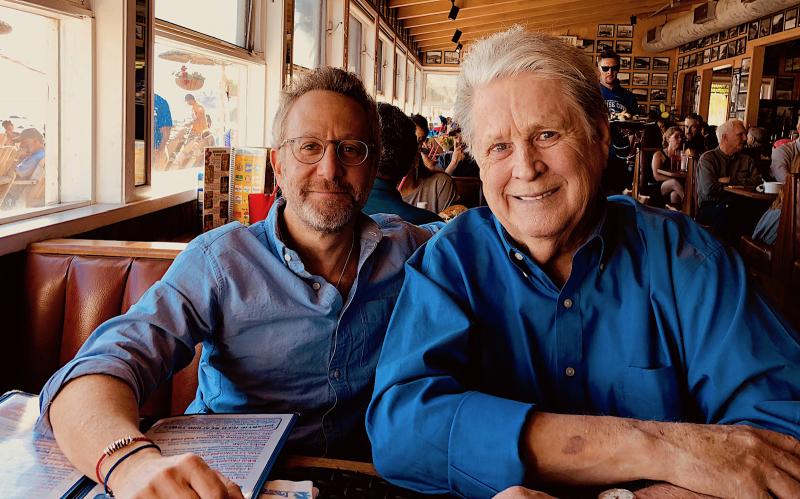Long Promised Road review - another attempt to probe the fragile genius of Brian Wilson | reviews, news & interviews
Long Promised Road review - another attempt to probe the fragile genius of Brian Wilson
Long Promised Road review - another attempt to probe the fragile genius of Brian Wilson
Documentary cluttered with too many talking heads

There has been no shortage of documentaries about king Beach Boy Brian Wilson, not to mention the 2014 bio-drama Love & Mercy, so the purpose of this new effort by director Brent Wilson (no relation) isn’t altogether clear.
As such eminent talking heads as Bruce Springsteen, Don Was and Elton John are wheeled out to testify to Brian’s brilliance, a sceptic might detect the unseen hand of Brian’s current wife and manager Melinda. Her mission to spruce up her husband’s reputation for posterity was previously discernible in the discreetly airbrushed 2016 autobiography I Am Brian Wilson.
While Springsteen comes out with some choice phrases to describe Wilson’s work, such as the way it expresses “joyfulness even in the pain of living”, he sounds like he’s delivering one of those earnest induction speeches at the Rock and Roll Hall of Fame, while Was admitting that he has no idea how Wilson created the unique sonic textures of “God Only Knows” really doesn’t take the viewer much further forwards. All of this is a distraction from what the film does best, which is to give us some idea of what it’s like to spend time in Wilson’s company (Brian in the studio, back in the day, pictured below). The spine of the piece comprises scenes where veteran Rolling Stone contributor Jason Fine drives Wilson around Los Angeles, revisiting significant locations from his personal history – the site of the family home in Hawthorne where he grew up, assorted recording studios, a favourite diner in Beverly Glen, the spot where Wilson’s health food store Radiant Radish once stood, his various homes etc – while gossiping as comfortably as it’s possible to do with the eccentric star. A notoriously skittish interviewee who’s liable to flee from his interrogators in mid-sentence, Wilson might cut off a question with a few terse monosyllables, or if you’re lucky offer an anecdote about his earliest experiments with LSD or talk about his life-long shyness with women.
The spine of the piece comprises scenes where veteran Rolling Stone contributor Jason Fine drives Wilson around Los Angeles, revisiting significant locations from his personal history – the site of the family home in Hawthorne where he grew up, assorted recording studios, a favourite diner in Beverly Glen, the spot where Wilson’s health food store Radiant Radish once stood, his various homes etc – while gossiping as comfortably as it’s possible to do with the eccentric star. A notoriously skittish interviewee who’s liable to flee from his interrogators in mid-sentence, Wilson might cut off a question with a few terse monosyllables, or if you’re lucky offer an anecdote about his earliest experiments with LSD or talk about his life-long shyness with women.
Fine plays the role of carer rather than interviewer, gently nudging the 79-year-old Wilson to open up on various topics, but never pushing him hard. Rather touchingly, Wilson admits that he doesn’t have many friends he can talk to, and expresses his relief at the way Fine’s unthreatening manner helps him to relax. The most startling sequence is where Fine mentions in passing that Brian’s sometime songwriting collaborator and Beach Boys manager Jack Rieley had died. The camera stays locked on Wilson’s face as he struggles to deal with his shock and grief at this news, which apparently hadn’t reached him in the several years since Rieley’s death.
Brian’s mental health issues are mentioned but not explored in depth (apparently he suffers from schizoaffective disorder), though his strange facial tics suggest a man reliant on meds of some sort, but his memory still seems intact. In scenes of him rehearsing with his current band, he shows he’s still capable of cracking the whip when his musicians aren’t quite getting it right. But what the film demonstrates above all is that whoever the “real” Brian Wilson is, we’re never going to find him now.
rating
Share this article
The future of Arts Journalism
You can stop theartsdesk.com closing!
We urgently need financing to survive. Our fundraising drive has thus far raised £49,000 but we need to reach £100,000 or we will be forced to close. Please contribute here: https://gofund.me/c3f6033d
And if you can forward this information to anyone who might assist, we’d be grateful.

Subscribe to theartsdesk.com
Thank you for continuing to read our work on theartsdesk.com. For unlimited access to every article in its entirety, including our archive of more than 15,000 pieces, we're asking for £5 per month or £40 per year. We feel it's a very good deal, and hope you do too.
To take a subscription now simply click here.
And if you're looking for that extra gift for a friend or family member, why not treat them to a theartsdesk.com gift subscription?

Add comment